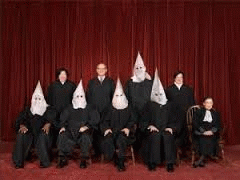Tuesday's decision by the US Supreme Court gutting the 1965 Voting Rights Act is an outrage that must be answered by working people. This act of judicial oppression is a milestone in the mounting attacks on democratic rights by the US financial aristocracy and its political servants.
By a 5-4 margin, the court effectively abrogated one of the most important pieces of civil rights legislation in American history. The Voting Rights Act remains on the books, but its enforcement mechanism has been declared unconstitutional and struck down.
The opinion written by Chief Justice John Roberts is insolent in its dismissal of any concern over five unelected judges overturning an act of Congress and defying the popular will. This ruling will shock and anger millions of working people -- and it should.
Roberts, Antonin Scalia, Clarence Thomas, Samuel Alito and Anthony Kennedy will go down in history alongside those high court justices who issued the pro-slavery Dred Scott decision in 1857. On the eve of the 150th anniversary of the battle of Gettysburg, these minions of American capitalism have demonstrated that the US ruling class is opposed to the democratic principles for which millions of working people have given their lives.
The narrow majority dropped any pretense to judicial restraint or respect for the separation of powers, overturning a law that was reauthorized only seven years ago by overwhelming votes -- 98-0 in the Senate, 390-33 in the House of Representatives -- and signed into law by a Republican president, George W. Bush.
In striking down a key section of the Voting Rights Act, the court majority defied the plain language of the Constitution. The Fifteenth Amendment, adopted in the wake of the Civil War, reads:
Section 1. The right of citizens of the United States to vote shall not be denied or abridged by the United States or by any State on account of race, color, or previous condition of servitude.Section 2. The Congress shall have power to enforce this article by appropriate legislation.
For nearly a century, Congress took no action to enforce the Fifteenth Amendment, while African Americans were systematically disenfranchised throughout the southern states. Only in response to mass civil rights struggles that spanned more than a decade was the Voting Rights Act finally enacted in 1965. The law is explicitly grounded on the language of Section 2, which provides the most sweeping grant of legislative power that can be afforded by the Constitution.
Section 4 of the Voting Rights Act identified those states, mainly in the South, which were to face federal oversight of voting and election law changes because of their long history of excluding African Americans from the polls. In the course of several renewals, most recently in 2006, Congress broadened the law to include discrimination against minority language groups, such as Hispanics, and added more states or counties found to have engaged in discriminatory practices.
Section 4 currently covers all of nine states -- Alabama, Alaska, Arizona, Georgia, Louisiana, Mississippi, South Carolina, Texas and Virginia -- and parts of seven others -- California, Florida, Michigan, New Hampshire, New York, North Carolina and South Dakota.
The court majority declared that the coverage formula laid down in Section 4 had become outdated because of increases in registration and turnout at the polls on the part of African American voters. But the majority opinion scarcely attempted to justify this claim. Roberts wrote, "When the law was last renewed, in 2006, Congress relied on data from decades before." But nowhere did he address the thousands of pages of evidence of ongoing acts of racial discrimination accumulated as part of the 2006 renewal.
In fact, the majority opinion in Shelby County v. Holder offers nothing of any substance, legally or factually. It is a pile of words concocted for the purpose of justifying a decision reached long in advance -- and foreshadowed in the language of an earlier decision, Northwest Austin Municipal Utility District Number One v. Holder in 2009, which turned aside a previous challenge to the Voting Rights Act on technical grounds.
If the ultra-right majority on the court now feels emboldened to go further, it is because it is not acting in a vacuum. These justices are encouraged by the general atmosphere of reaction that permeates government and media circles.
The president of the United States asserts the right to target any individual, including US citizens, for assassination. Those such as Edward Snowden who expose government criminality are witch-hunted and vilified as traitors. An entire American city, Boston, is placed on lockdown in complete disregard of fundamental constitutional rights -- all without any significant opposition from within the political establishment.





